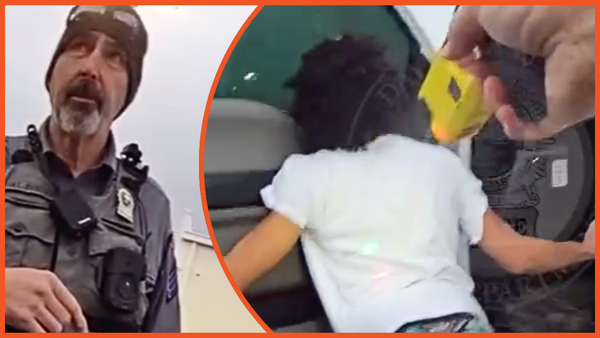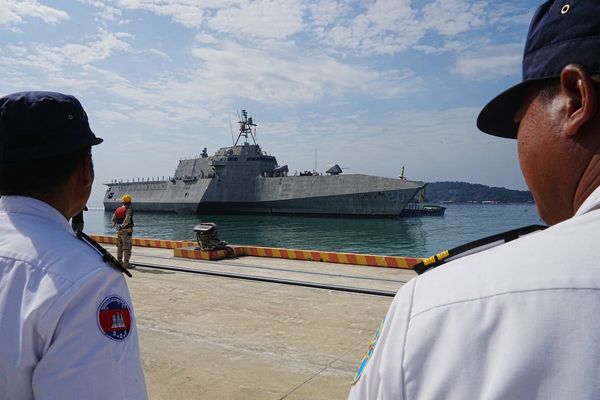A senior police officer who investigated Brittany Higgins's rape allegation says he was under pressure from her, the media and the police internally to charge Bruce Lehrmann.
Fronting an inquiry into how the case against Mr Lehrmann was handled by criminal justice agencies, ACT Detective Superintendent Scott Moller said the investigating officers in the matter were under an exceptional amount of pressure.
Superintendent Moller said he believed there was not enough evidence to charge Mr Lehrmann but was told by ACT Commander Michael Chew to "get it done".
"I don't want to cast all the blame … really it is hard for me to articulate the kind of pressure that was on us at that time," he said.
"I didn't think there was enough evidence and then I received the director's advice, and certainly after receiving his advice I decided to go ahead."
Superintendent Moller said there was also a "significant amount of pressure" from Ms Higgins.
"There was a real desire to expedite this process and get Mr Lehrmann before the court … from the public, the media, my own organisation," he said.
Commander Chew is also expected to face questioning in the inquiry as it continues.
Mr Lehrmann has maintained his innocence and there have been no findings against him after the trial was abandoned.
'Made fun of in the national media'
Day eight of the ACT board of inquiry began on Monday after an hour's delay.
Inquiry chair Walter Sofronoff opened the proceedings by criticising last Friday's front page of News Corp masthead The Australian, which featured a photograph of the ACT's chief prosecutor.
Mr Sofronoff questioned the newspaper's decision to publish the photo of the Director of Public Prosecutions (DPP), Shane Drumgold, drinking a beer in the driveway of his home, accompanied with the headline: "Crown lager or Drumgold bitter? Prosecutor calls beer o'clock".
"I'm stumped at trying to think of the proper purpose of doing this," Mr Sofronoff told the inquiry.
He also said he was concerned that those giving evidence to the inquiry may be affected by the newspaper's front page.
"My real worry is that the witnesses who have been willing to help me will think this is part of the price … being made fun of in the national media," he said.
"This kind of publication risks interfering with the course of my inquiry — it risks interfering with my ability to fulfil my statutory duty."
Last week Mr Drumgold took a leave of absence from the DPP after giving his own evidence in the inquiry.
Mr Sofronoff told the inquiry he had written to The Australian's editor Michelle Gunn seeking justification for the front page.
Moller Report 'highlighting what I thought were the key issues'
The inquiry also heard Superintendent Moller compiled a document about the investigation into the alleged rape, informally known as the Moller Report.
The document was handed to Commander Chew to inform his decision on whether to pursue the charges.
In the report, Superintendent Moller described Ms Higgins as "evasive", "uncooperative" and "manipulative".
It claimed that Ms Higgins repeatedly refused to provide police with the phone she was using at the time of the alleged incident.
Today, when asked if the report was highly critical of Ms Higgins, Superintendent Moller disagreed.
"I think it's an account of the investigation and what came out of the investigation," he said.
He later conceded that he could have included more details about inaccuracies in Mr Lehrmann's version of events.
"Could I have put some of those details in my report to him? I could have, I accept that, but I was highlighting what I thought were the key issues," he said.
Other police documents also sent to the Commander revealed police were concerned Mr Lehrmann's account did not seem plausible — that two people would go into an office late at night and have no further contact.
In the letter to the ACT's Chief Police Officer that sparked the inquiry, Mr Drumgold said he had felt pressure from police not to indict Mr Lehrmann.
Superintendent Moller said that Mr Drumgold's questioning of some of the decisions by police caused quite a lot of concern for him and his investigation team.
He said he made decisions about the investigation to cover himself against the prospect of criticism from the DPP.
"Equally the other thing that was weighing on my mind at the time was the scrutiny from the DPP… I wanted to make sure we were doing everything perfectly," Superintendent Moller said.
'Media could influence the trial'
Superintendent Moller was also questioned over the decision to conduct a second interview with Ms Higgins, a move the counsel assisting suggested was contrary to the Victims of Crime Act, accusing Superintendent Moller of using the information from that interview "to bolster a submission that charges ought to not be preferred".
He defended the decision to interview Ms Higgins a second time.
"We had a number of concerns about the evidence that was being presented to us and wanted to clarify some inconsistencies," he said.
The counsel assisting Mr Sofronoff, Joshua Jones, said Superintendent Moller had concerns about Ms Higgins's vulnerability and health and questioned why he would put her through a second interview, essentially putting her wellbeing at risk.
Superintendent Moller described it as a "dilemma", and a choice between serving the victim and keeping the scope of the investigation open.
"I think there was value to the investigation — [we have] conflicting responsibilities as an investigator and our victim-centric approach," he told the inquiry.
According to a statement from Victims of Crime Commissioner Heidi Yates, after the second interview, Superintendent Moller spoke to Ms Higgins and said something to the effect of "If you are speaking to the media and this can't go ahead, then it'll all be for nothing".
Superintendent Moller said he did not remember that particular part of the conversation.
"I told Ms Higgins not to do any media, and I told her that the media could influence the trial," he told the inquiry.
Ms Yates said in her statement that this went against the victim-centric approach and accused Superintendent Moller of using a "harsh tone" with Ms Higgins, which he refuted.
The inquiry continues on Tuesday.







